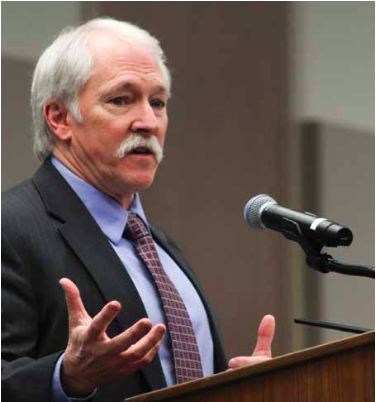
“Sexual assault can be damaging. Don’t be afraid to ask for help,” Ferris social work sophomore Stephanie Wilson said.
In honor of Sexual Assault Awareness Month, the Ferris Social Work Association educated students about sexual assault at a five-star panel Wednesday, April 3.
The objective of the event was to show students on campus what resources are available to them, and to show what the process of dealing with and prosecuting an assault looks like, according to Ferris social work senior and Social Work Association President Nicholas Hadley.
“People should bring light to it so healing can happen, and people can also just feel like they have a space to discuss what’s going on,” Wilson said.
Speakers at the event included Ferris Assistant Professor of Social Work Peter Hector, Ferris Title IX Coordinator Kaitlin Zies, Ferris Department of Public Safety Director Bruce Borkovich, Women’s Information Services, Inc. (WISE) Sexual Assault Advocate Denae Langan, Mecosta County Prosecuting Attorney Brian Thiede and Sexual Assault Nurse Examiner Shannon Behling.
“When it happens, very often people just want to forget that it happened. They’re terrified to speak out about it for a lot of reasons,” Hector said. “The more we talk about it, the more people come aware about it, the less isolated people will feel, the less alone they are, the more apt they are to actually get the help that they need.”
According to the 2018 Ferris Campus Climate survey, which surveyed 1,518 students, 17% reported unwanted sexual experiences. For women, that number was higher, reaching 20%.
“It’s so prolific, and we don’t talk about it enough. There’s still so many misperceptions around and that’s why we did this, to demystify the process. It’s not like we will eliminate sexual assault, but we need to keep talking about it,” Hector said.
When a sexual assault occurs, the survivor has five days after the assault occurred to get a forensic rape kit done at the local hospital. At that point, the survivor does not have to decide if they want to prosecute. The hospital will hold onto the kit for 18 months to give the assault survivor time to decide how they wish to proceed.
Afterward, if the survivor wishes to take their forensic kit to the police station, the station will hold on to it indefinitely, whether the survivor wants to pursue further action or not.
There are different resources available to students involved in a sexual assault on campus.
One example is the Title IX office. A student can go to the office to talk about what happened. From there, Zies said she will work with students and professors to help facilitate a plan to keep them successful in school while they are dealing with the assault, such as asking a professor to extend their attendance policy. Zies said she can also help students move out of their residence hall or help them find a different section of a current class if the perpetrator happens to be in the same class or hall.
Zies will help survivors understand what further options they have in pursuing court action, if desired.
“Hopefully the students can kind of understand how the process works, be a little less intimidated by it or know where to go if they do want to pursue things,” Hector said.
Further resources include Birkam Health Center, which provides free counseling to all Ferris students. Additionally, survivors can reach out to WISE. According to their website, WISE provides crisis intervention and support services to survivors of domestic and sexual violence. Their services to victims are free and they have a 24-hour crisis line at 1 (800) 374-WISE.
